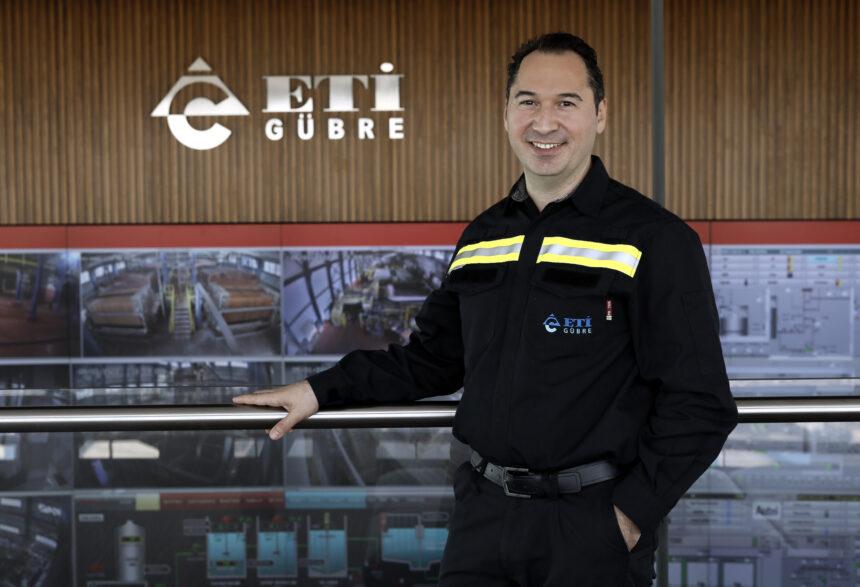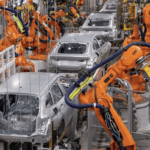BY HANDAN SEMA CEYLAN
Cengiz Holding’s mining subsidiary Eti Bakir, which performs its decision to develop its investments within the frame of the circular economy by putting its different facilities into use in the same integrated structure, kicks off the negative waste period with its Mazidagi Metal Recycle and Integrated Fertilizer Plant in Mardin. Although the company prefers to use the “residual” expression instead of “waste,” the facility, which became operational with an investment of USD 1.2bn by Cengiz Holding and will operate with the negative waste vision, will amortize itself in eight to 12 years in line with the commodity prices.
The fundamental reason for the facility’s construction is recycling, according to Emre Kayisoglu, General Manager of Mazidagi Metal Recycle and Integrated Fertilizer Plant at Eti Bakir. “Copper accounts for just 1.5-2.0% of everything we extract in our Kure Plant. We researched what we could do with the remainder. The fact that it contained cobalt was our main motivation,” Kayisoglu said. “Cobalt in it hovers around 0.5%. As it is very precious, we took action,” he added.
Pyrite concentrate is the residual product that emerges in the copper production process at the Kure plant. It is transported by train to the Mazidagi facility, which is approximately 1,200 kilometers away from the Kure plant. Cobalt, the key element of the 21st century, is recycled using state-of-the-art technologies with a purity of 99.99%. Cobalt, called the element of the century, is highly used in the technology, petrochemicals, electric vehicles, and aircraft industries, in addition to batteries and catalyzers.
Regarding the process at the facility, the company initially transforms sulfur into sulfuric acid. It generates power while burning it. “That electricity corresponds to around 70% of our facility’s need. Then, we obtain cobalt, zinc, copper, and iron, respectively. That is what we called the negative waste concept,” Kayisoglu noted. Through this concept, Eti Bakir prevents the tailings dam of the Kure plant from filling; it empties there and fully transforms the output into products and generates electricity. “We are one of the most beautiful precedents of the sustainable and circular economy in the world. Moreover, the investment will amortize itself in eight to 12 years in line with the commodity prices,” Kayisoglu added.
THE UK ROUTE ON BLACK MASS TRANSFORMATION
As Kayisoglu says, they are integrated in Turkey and globally. Eti Bakir acquired the UK-based ICoNiChem, which has a 40-year history in Widnes. ICoNiChem raised the decomposition capacity of cobalt from nickel, sodium, and magnesium from 900 tons to 1,800 tons with investments by the company. At the same time, it has started to process the products coming from the Mazidagi Metal Recycle and Integrated Fertilizer Plant in the UK. With a capacity of 2,500 tons, Eti Bakir currently manufactures 2% of the global cobalt production. The company exports to over ten countries, including the U.S., the UK, Spain, Korea, and China. It also conducts R&D studies at the Mazidagi Metal Recycle and Integrated Fertilizer Plant and in the UK. Excluding automotive, Eti Bakir brings the black mass and cobalt from end-of-life mobile phones, laptops, and tablets into the economy. Nowadays, it is conducting work for lithium.
READY TO ENCOURAGE OTHER INVESTORS
Iron, steel, and aluminum are recycled the most in the world, according to Kayisoglu. “Recycling is especially poor for expensive materials, which we call minor. A technology should be developed to recover the minor minerals contained in these residues of natural resources,” he said. “That’s why I call what we do the Mining 4.0. We obtain nickel in very low grades. We get 20 tons of nickel for 500,000 tons of material. We are ready to pioneer on the R&D side and encourage other investors. Our efforts are to provide an important value-added to Turkey.”
To him, there are three critical trends in material technology worldwide: recycling, weight reduction, and reduction of emissions of production methods. The share of recycling hovers around 5% in the world’s mining industry. As Kayisoglu says, immediate work should be conducted to raise this figure to some 35% first and then to 50%.
Touching on the fact that mining is among the most criticized sectors, Kayisoglu said there is no such thing as not having mining done. “It’s important to ensure that mining is carried out within the frame of rules, laws, and regulations. Mining is life. Otherwise, we don’t even have a chance to sit on the chair we are sitting on now.”
AMONG 45 COMPANIES WITH RMI CERTIFICATE
Eti Bakir aims to be a role model in Turkey, the region where Turkey is, and the international arena. From this perspective, the company received a certificate from the U.S.-based Responsible Minerals Initiative (RMI). RMI is an organization that audits and certifies refineries that produce cobalt, zinc, and copper in the world whether they create a responsible supply chain and treat their employees responsibly. “One of the biggest actors operating in the automotive industry audited our facility as it uses our cobalt. That’s why we decided to receive a certificate. We are one of the 45 companies with that certificate in cobalt worldwide. We are also among the seven enterprises with that certificate in copper and two companies with it in zinc worldwide.”
Turkey’s only phosphate mine relaunched after two decades
Eti Bakir renewed and put into use Turkey’s only phosphate deposit, which was shut down in 1994 and remained idle. Phosphate is very critical and strategic for agricultural development. “Today, we have no phosphate except this phosphate deposit when we close its doors and are alone as a country,” said Emre Kayisoglu, General Manager of Mazidagi Metal Recycle and Integrated Fertilizer Plant at Eti Bakir. “If we don’t have phosphate fertilizer, we cannot produce bread, wheat, or corn and reduce the crop by half. We manufacture 100% domestic fertilizer at our facility. There is no other company like that in Turkey.”
Builds a pistachio forest with donations from visitors
Eti Bakir has the Micro Forest project. “Our suppliers and companies, which we attract their attention worldwide, continuously visit us to take cues from our facility. For instance, Swedes visited us a short while ago to set up a similar facility,” said Emre Kayisoglu, General Manager of Mazidagi Metal Recycle and Integrated Fertilizer Plant at Eti Bakir. The company desired to turn the time it spent for visitors into value and started a project to afforest their mine sites. “We don’t accept donations from students and journalists,” Kayisoglu noted. Eti Bakir conducts mining operations in degraded forest lands, which look like forests. “When we hand over the land, we should hand on it as forest. That’s why mining is good for forests. We transform the lands where we conduct mining operations into forests,” Kayisoglu added. The company plants pistachio and almond trees to contribute to the economy of those regions. “We particularly do that in lands which we return to forests. The nearest villagers can go to the Forest Villagers Cooperatives and collect pistachios and almonds for a certain fee. Many students visit Mazidagi. Students of science high schools or engineering faculties visit. We did not only have interns from regional universities, the Middle East Technical University, or Istanbul Technical University but also had 17 interns from Imperial College London in Mazidagi in 2023.”










